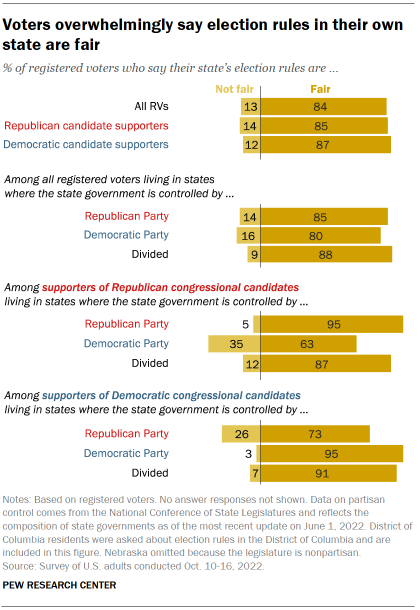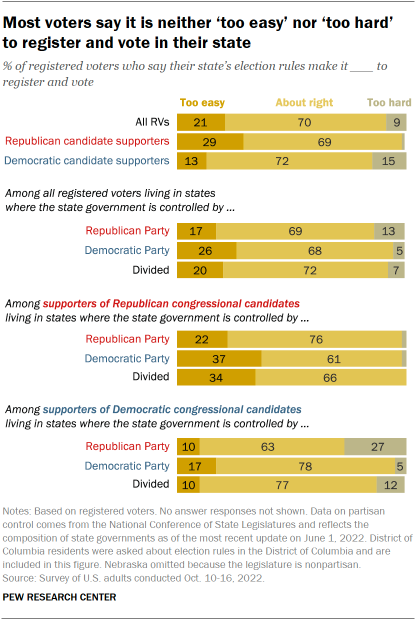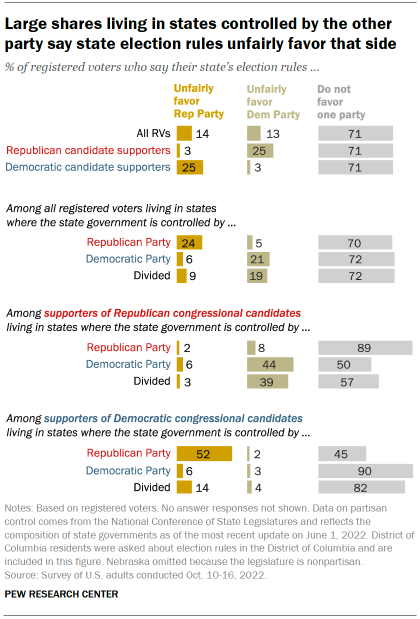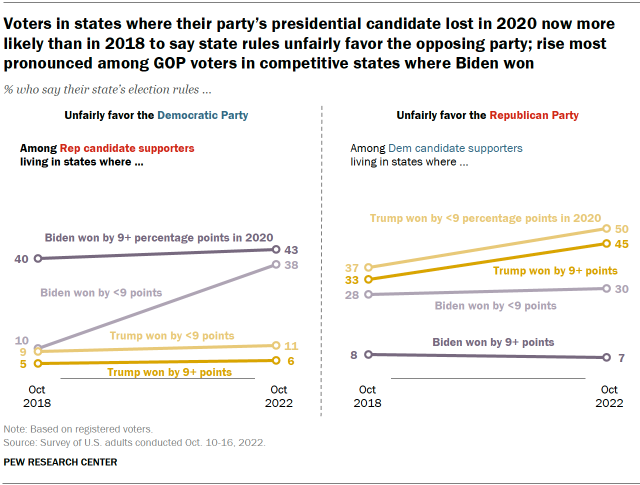
Voters generally see their own states’ election rules as fair. More than eight-in-ten registered voters (84%) say that the election rules in their state are fair, compared with just 13% who say the rules in their state are unfair. However, voters are less likely to characterize their state’s rules as fair when they live in a state where control of state government is held by the party they do not back in the midterms.
Overall, nearly identical shares of voters who support a Republican candidate for the U.S. House (85%) and those who support a Democratic candidate (87%) say that their state’s rules are fair.
At a similar point in the 2018 election campaign, Republican candidate supporters were more likely than Democratic candidate supporters to say that their state’s rules were fair, though large majorities in both groups said this (93% of Republican supporters and 81% of Democratic supporters).
Today, 95% of Republican supporters living in a state where Republicans control the state government, and an identical share of Democratic supporters living in a Democratic-controlled state, say that their state’s election rules are fair.
Among Republican backers living in a Democratic-controlled state, 35% say their state’s election rules are unfair, as do 26% of voters who support a Democratic candidate but live in a Republican-controlled state.

A similar pattern holds when voters are asked whether their state’s election rules make it too easy or too hard to register and vote.
Seven-in-ten voters, including 69% of those who support a Republican candidate and 72% of those who support a Democratic candidate, say that their state’s election rules for registration and voting are “about right,” though these responses vary somewhat depending on which party controls the state government.
About three-in-ten Republican supporters (29%) say that their state makes it too easy to register and vote, while hardly any Republican supporters (just 1%) say their state makes it too hard.
However, GOP voters who live in a Democratic-controlled state (37%), or a state with divided government (34%), are more likely than those living in a Republican-controlled state (22%) to say that their state’s election rules make it too easy to register and vote.
Similar shares of all voters supporting Democratic candidates say that their state’s rules make it too easy (13%) or too hard (15%) to register and vote. Yet Democratic supporters who live in a Democratic-controlled state are more likely to say it is too easy to vote (17%) than too hard (5%), while those living in a Republican-controlled state are more likely to say it is too hard to vote (27%) than to say it is too easy (10%).
The shares who say their state’s election rules about registration and voting are “about right” are essentially unchanged since October 2018, when 70% of all registered voters, 68% of voters supporting a Republican candidate and 70% of voters supporting a Democratic candidate said this.
Partisan voters in states controlled by opposing party are most likely to say the rules favor their opponents

Roughly seven-in-ten registered voters (71%), including identical shares of voters who support a Republican candidate and those who support a Democratic candidate (71% each), say that their state’s election rules do not favor one major political party over the other. However, substantial shares of both Republican and Democratic candidate supporters who live in a state where the government is controlled by the other party do see favoritism in their state’s laws.
About half of voters who support a Democrat and who live in a Republican-controlled state (52%) say that their state’s election rules unfairly favor the Republican Party, compared with 14% of those living in a state with divided government and just 6% of those in a Democrat-controlled state.
Among Republican voters, 44% of those living in a Democrat-controlled state and almost as many of those living in a state with divided government (39%) say their state’s rules unfairly favor the Democrats, while 8% of those living in a Republican-controlled state say this.
Views of state election rules and the 2020 presidential election
Republican voters who live in states that Joe Biden won by less than 9 percentage points in 2020 are much more likely to say the election rules in their state unfairly favor the Democratic Party than they were four years ago. Nearly four-in-ten supporters of Republican congressional candidates who live in these states (38%) now say that their state’s rules favor Democrats, compared with 10% who said this at a similar point in 2018.

The views of Republican backers who live in states Biden won by 9 points or more are essentially unchanged since 2018, as are the views of GOP voters living in states where Trump won.
Voters who support Democratic candidates and live in states Trump won in 2020 have also become more likely to say that their state’s rules unfairly favor Republicans, with the size of Trump’s victory making little difference: Those living in states Trump won by larger margins are 12 points more likely to say this than they were four years ago, and those living in states he won by smaller margins have become 13 points more likely to say this. However, the increase in the shares saying state rules favor the other party is less pronounced among Democrats in states won by Trump than among Republicans who live in states Biden won by narrower margins.


